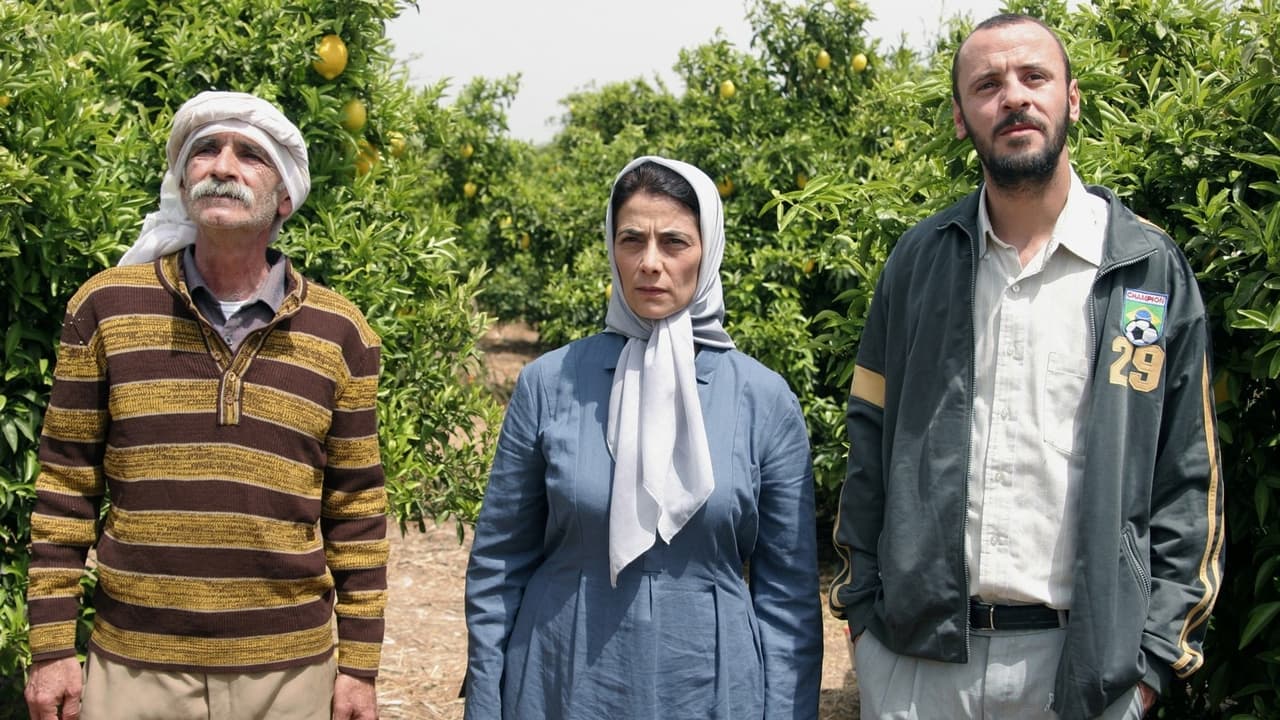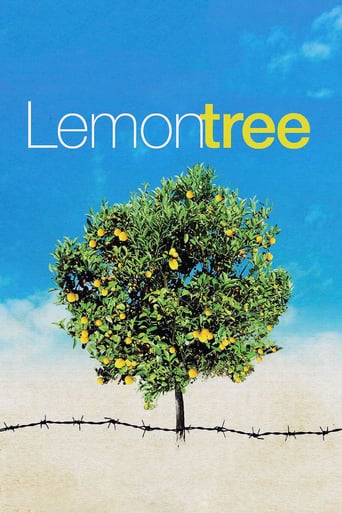johnnyboyz
"Lemon Tree" is not a particularly political film, but its roots lie in a deeply divisive and inherently political issue. Its overall attitude to the seemingly perpetual conflict between Jews and Arabs on the Sinai Peninsula seems to be to poke fun at it, even point out the absurd nature of it and the ridiculous conclusions people involved in it reach - such as the rather far-fetched belief that a small orchard might be used as the means for an armed assault on a premises housing someone important. Its second of two agendas is to remark that, ultimately, the conflict is one being fought between two sets of human-beings, all of whom are flesh and blood and as flawed in their thinking and attitudes as the rest of us. It does not seem coincidental that the film's opening shot is that of a large knife dividing into two halves a lemon, for here is a film about a problem to do with binaries; segments and redistribution. Cutting the lemon is Hiam Abbass' middle-aged Arabian woman Salma Zidane, somebody who is living in the West Bank and runs an orchard housing the eponymous lemon trees which has been in her family for decades. She grew up tending the trees with her father, but with him deceased and her children off and away studying in America, she relies on the elderly Abu Hussam (Tarik Copti) to help her harvest and maintain the plot. On the other side of the orchard is, quite literally, the nation of Israel.From nowhere, the very real situation that has engulfed her geographical area since the forging of a Jewish state in Western Asia lands directly on her doorstep: none other than the Israeli Defence Minister, played by Doron Tavory, moves into the villa on the plot immediately next door to her land. In a flash, lookout towers go up; fences are erected and guards armed to the teeth patrol the perimeter. Director Eran Riklis utilises here the harsh juxtaposition of the harmless, aging fruit pickers of Salma and Abu going about their business with the extreme militarism of the new neighbours for what I assume to be comedic effect - the statement is subtle, but effective, in what is a difficult situation to get across a political point without appearing reactionary.To Abu and Salma's horror, the Minister's paranoia about being exposed to some sort of attack by Israel's enemies extends so far that he places an executive order to have the orchard torn down... His reckoning being that the collection of trees might act as fantastic cover for a group of soldiers or militants to surprise the Israeli during some kind of siege of the villa. Not content to take this as it stands, Salma decides to drag the decision through the judicial system - stopping at nothing to keep her lemon trees.From here, one is able to reach a glut of conclusions about the film and enjoy it in a variety of different ways. The most basic of readings is to enjoy it as little more than a procedural legal thriller, where somebody of some power has done something which victimises somebody else and that said victim must fight their way through the courts for an unlikely victory. This in itself brings about an array of problems, issues no less pertaining to legal costs; mind numbing levels of mostly unresponsive bureaucracy on the judiciaries' end and the sheer emotional toil. "Lemon Tree" reminded me, in this respect, of an old Senegalese film you will not have seen entitled "Certificate of Indigence", where a woman largely on her own wades through the system to seemingly obtain a basic right to even be acknowledged. Alternatively, the film is a love story: the lawyer Salma hires, Ziad (Ali Suliman), to work with her throughout the case eventually comes to fall in love with her - the fact he is already married complicates matters further. "Lemon Tree" might also be read into as a feminist piece - a mousy, and otherwise defenceless, woman seeks a victory over a patriarchal figure. Lastly, it might be 'enjoyed' as either pro-Palestinian - where the Israelis are bullies and the Arabs victims - or inherently Zionist, where the last bastion of the homeland of the Jewish people's minister for defending that land is merely taking the rightful precaution for his survival. Does he not have a point about the orchard in the first place? Director Eran Riklis, who is Israeli born, manages to find a film-making 'place' which depicts Israelis as both shallow reactionaries and bullies, but also, in the form of the Minister's wife, sympathisers of the poor Arab woman next door who is about to lose her beloved trees. Scenes involving the two often humanise them, meaning the Jews' role in the film is not to fulfil the role of the stock Zionist oppressor/villain. An Arab, for sure, is the victim in the film, but we are somehow able to sympathise with Salma in her plight without being anti-Semites - her lawyer, the aforementioned Ziad is presented as a deviant in one respect as he would quite easily have gone behind his existing wife's back had Salma not rejected his advances. However one views "Lemon Tree", one ought to be able to enjoy it.
jackasstrange
Lemon Tree is a very good small film. I am not familiar with Israeli & Palestinian culture further than what is told everyday on the news and all. Is a surprisingly good film. It uses various filmmaking techniques to make the story as thematic as possible. The predominant green and light-green colors in the art direction's palette scheme, for example - remind us the color of the lemon. The story itself can be seen as an allegory to the conflicts between Palestinians and Israeli. They both wants different things from a same tree, and they fight until no tomorrow to 'make their wishes come true'. Even a perhaps "small thing' can turn into a national problem. Also, the character development is just fine, and so is the acting. It goes overly dramatic a little bit, but nothing than can diminishes the qualities of the film.
aFrenchparadox
It's about dignity and hope in individuals. About a woman standing up for her rights and on the path freeing herself from social conventions. About another woman learning from simply observing the first one standing up to stand up too (though mostly for herself). About the fact that a nation can't be considered as having an unique position and that reality is always more subtle. Hence about the fact that hope can come from individuals who might change their nation, step by step (I am far too much an utopist on this one, given the outcome of the film). It's also (obvioulsy given the plot) about politics, and quite especially about public relations in politics. Especially also about how individual lives serve political interests, regardless of how these lives could evolve. The outcome doesn't reach the expectations you build watching the film, so it's finally also about how the Middle-East conflict is not ready to be solved, at least not within a short time. At last Hiam Abbass, playing the main character, is just amazing.
tom van de Bospoort
For this very good title my mother was watching it with me after recording it off film4. she was screaming and outraged at the treatment of the lady with the lemon tree grove and how the head of defence across the border was treating her with such a bad attitude, portrayed as if he was opposing the cut down, when really he was supporting the deforestation of her family grove of lemons.The film follows her struggle even showing how the defence minister has uprooted other groves elsewhere in the from of olive trees in the safety of people and the worry of terrorism, which is what seals her trees fate.The state and the government of Israel against a Palestinean agriculturist, this film is truly moving and makes you side for the 'little people'. Not many films get me so on side like this but this is good and shows how in those countries the people and especially women are treated bad and are not taken into account.A must see, for womens rights.

